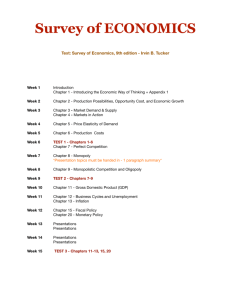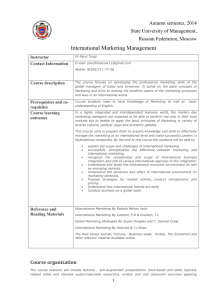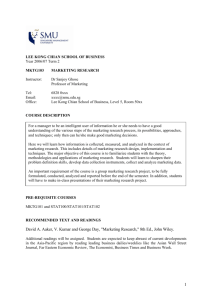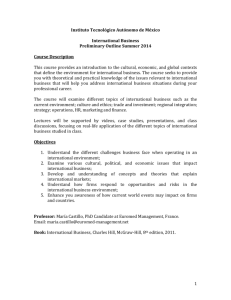PUBP710-B04 - School of Policy, Government, and International
advertisement
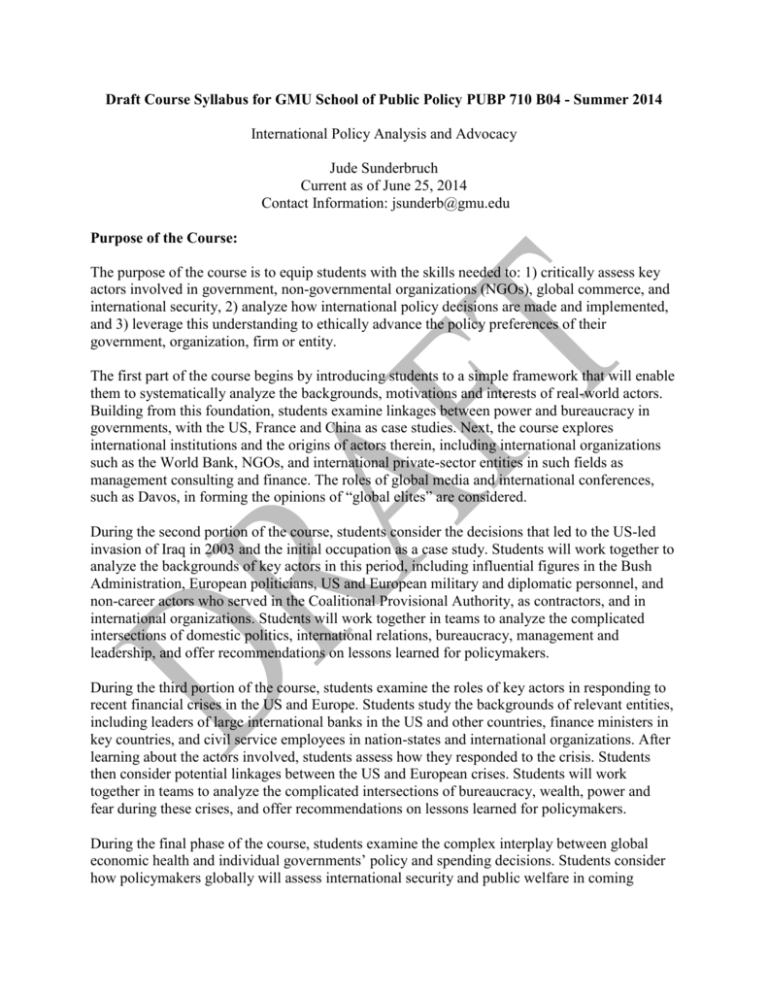
Draft Course Syllabus for GMU School of Public Policy PUBP 710 B04 - Summer 2014 International Policy Analysis and Advocacy Jude Sunderbruch Current as of June 25, 2014 Contact Information: jsunderb@gmu.edu Purpose of the Course: The purpose of the course is to equip students with the skills needed to: 1) critically assess key actors involved in government, non-governmental organizations (NGOs), global commerce, and international security, 2) analyze how international policy decisions are made and implemented, and 3) leverage this understanding to ethically advance the policy preferences of their government, organization, firm or entity. The first part of the course begins by introducing students to a simple framework that will enable them to systematically analyze the backgrounds, motivations and interests of real-world actors. Building from this foundation, students examine linkages between power and bureaucracy in governments, with the US, France and China as case studies. Next, the course explores international institutions and the origins of actors therein, including international organizations such as the World Bank, NGOs, and international private-sector entities in such fields as management consulting and finance. The roles of global media and international conferences, such as Davos, in forming the opinions of “global elites” are considered. During the second portion of the course, students consider the decisions that led to the US-led invasion of Iraq in 2003 and the initial occupation as a case study. Students will work together to analyze the backgrounds of key actors in this period, including influential figures in the Bush Administration, European politicians, US and European military and diplomatic personnel, and non-career actors who served in the Coalitional Provisional Authority, as contractors, and in international organizations. Students will work together in teams to analyze the complicated intersections of domestic politics, international relations, bureaucracy, management and leadership, and offer recommendations on lessons learned for policymakers. During the third portion of the course, students examine the roles of key actors in responding to recent financial crises in the US and Europe. Students study the backgrounds of relevant entities, including leaders of large international banks in the US and other countries, finance ministers in key countries, and civil service employees in nation-states and international organizations. After learning about the actors involved, students assess how they responded to the crisis. Students then consider potential linkages between the US and European crises. Students will work together in teams to analyze the complicated intersections of bureaucracy, wealth, power and fear during these crises, and offer recommendations on lessons learned for policymakers. During the final phase of the course, students examine the complex interplay between global economic health and individual governments’ policy and spending decisions. Students consider how policymakers globally will assess international security and public welfare in coming decades. Throughout the course, students learn safeguards to consciously disaggregate policy analysis from advocacy, enabling them to become more effective in either role as appropriate, given their professional choices. Class Format: The course includes a mix of lecture, case study analysis, discussion and presentations. Students will be evaluated on quizzes, short papers, class participation and class presentations. Readings will include a mix of book chapters, scholarly articles, and other resources related to the course purpose as outlined above. Students will also watch several documentaries and short videos. Throughout the course, students will work in small groups to discuss assigned topics, conduct analysis, prepare presentations, and provide these presentations to other students. Learning Outcomes: Upon completion of this course, students will be familiar with techniques that will strengthen their ability to serve in a variety of policy analysis and advocacy roles in government, international commerce, and international security. Students learn how to employ an actor-based analytical framework as a complement to analysis grounded in theory and/or discipline-specific analytical tools. Students also learn approaches to advance the policy preferences of their agency/entity, while developing lasting, mutually productive relationships with individuals from other backgrounds. The course is specifically designed to complement the full range of graduate degrees offered at George Mason University’s School of Public Policy, with an emphasis on an interdisciplinary, international and practical approach to learning. Depending on their degree program, students may have more or less familiarity with different portions of the course. Through the use of smallgroup in-class exercises and presentations, students will consider alternate perspectives to those that may be widely accepted in their program of study. In turn, they will gain new insights into interdisciplinary analysis and how to effectively communicate with a broad audience. Required Texts: The Party: The Secret World of China’s Communist Rulers, Richard McGregor, Penguin, 2010 The Assassins’ Gate: America in Iraq, George Packer, Farrar, Strauss and Giroux, 2006 My Year in Iraq: The Struggle to Build a Future of Hope, L. Paul Bremer, 2006 After the Music Stopped: The Financial Crisis, the Response and the Work Ahead, Alan S. Blinder, Penguin Press, 2013 All other required readings will be available via Internet download and/or on Blackboard. Required Documentaries: Bush’s War, Parts 1 and 2, Frontline, PBS, 2008 (available from http://www.pbs.org/wgbh/pages/frontline/ or iTunes) Money, Power and Wall Street, Parts 1 and 2, Frontline, PBS, 2012 (available from http://www.pbs.org/wgbh/pages/frontline/ or iTunes) Optional Text: France’s Got Talent: The Woeful Consequences of French Elitism, Peter Gumbel, Editions Denoel, 2013 (available for Kindle download via amazon.com) Course Evaluation and Assignments: First In-Class Quiz: 15% Second In-Class Quiz: 15% First Short Paper: 20% Second Short Paper: 20% Participation: 15% Presentations: 15% In order to be successful in the course, you should complete the readings, watch the videos and documentaries, and actively participate in class. In addition, you should participate fully with other students in developing and making in-class presentations. Students will also be assessed on class participation and their contributions during presentations. There will be two short, in-class quizzes. These quizzes are designed to test student familiarity of the assigned course materials and comprehension of the class discussions. The quizzes will be straightforward if you have come to each class prepared and actively listened in each class. There will be two short papers. Each paper is expected to be no more than five pages in length. The first is designed primarily to assess students’ abilities to analyze actors involved in an issue of international policy. The second is designed to assess students’ abilities to ethically advocate for the policy preferences of a government, firm or entity. Additional guidance will be provided in class and via Blackboard. Students will get the most benefit from the course if they engage with all of the assigned readings. Many are short, and those that are longer were specifically selected to be readable and interesting. You will note that they are also paced so you will have time to absorb the readings and lectures prior to the quizzes. The number and variety of readings are also offset by the short length of the papers. The course is structured in this manner to maximize learning, while recognizing the demands on students’ time given the compressed summer schedule. For purposes of this course, the grades of A or A- are reserved for sustained excellence and outstanding performance that goes well beyond the minimal requirements of the course, both in written assignments and class participation. The grades of B and B+ are used to denote mastery of the material and very good performance in all aspects of the course. The grade of B- denotes marginal quality work that is not quite up to graduate level standards even though the minimal requirements of the course are met. The grade of C denotes work that is not acceptable at the graduate level. The grade of F denotes the failure to perform adequately on course assignments. Papers will be evaluated on the quality of research, sophistication of analysis, and clarity of writing. Comments on papers are meant as useful recommendations for improvement, not full explanations of the grade. Attendance Policy: It is essential to attend every session unless you have an emergency or unavoidable situation. In such a case, please communicate with me as soon as possible to discuss the situation. Students who must miss class due to emergencies, or adequately justified unavoidable situations, may be able to make-up a reduction in their grade by completing one or more short written assignments, as assigned. Students who choose to miss class due to personal choice decisions may partially make-up a reduction in their grade by completing one or more short written assignments as assigned. However, I reserve the right to consider the rationale for absences when assigning a final class participation grade. In the case of a weather cancellation or other unforeseen event that results in the cancellation of class, I will work with you to set up another class session during the week that will enable maximum participation by as many students as possible. If you cannot attend on the rescheduled date, I will work with you to make alternate arrangements. Electronic Device Policies: Students may take notes on phones, tablets or laptops, as long as such activity is not disruptive to others in the class. I will be actively engaging students throughout each class. If you are obviously distracted because you are doing something other than taking notes or reviewing course materials with your device (for example: writing e-mail, engaging with social media, surfing the Internet, etc.), it will adversely affect your grade. Academic Accommodation for a Disability If you are a student with a disability and you need academic accommodations, please see me and contact the Office of Disability Services (ODS) at 703-993-2474. All academic accommodations must be arranged through the ODS. SPP Policy on Plagiarism The profession of scholarship and the intellectual life of a university as well as the field of public policy inquiry depend fundamentally on a foundation of trust. Thus any act of plagiarism strikes at the heart of the meaning of the university and the purpose of the School of Public Policy. It constitutes a serious breach of professional ethics and it is unacceptable. Plagiarism is the use of another’s words or ideas presented as one’s own. It includes, among other things, the use of specific words, ideas, or frameworks that are the product of another’s work. Honesty and thoroughness in citing sources is essential to professional accountability and personal responsibility. Appropriate citation is necessary so that arguments, evidence, and claims can be critically examined. Plagiarism is wrong because of the injustice it does to the person whose ideas are stolen. But it is also wrong because it constitutes lying to one’s professional colleagues. From a prudential perspective, it is shortsighted and self-defeating, and it can ruin a professional career. The faculty of the School of Public Policy takes plagiarism seriously and has adopted a zero tolerance policy. Plagiarism may lead to failure for the course, resulting in dismissal from the University. This dismissal will be noted on the student’s transcript. For foreign students who are on a university-sponsored visa (e.g., F-1, J-1, J-2), dismissal also results in the revocation of their visa. To help enforce the SPP policy on plagiarism, all written work submitted in partial fulfillment of course or degree requirements must be available in electronic form so that it can be compared with electronic databases, as well as submitted to commercial services to which the School subscribes. Faculty may at any time submit student’s work without prior permission from the student. Individual instructors may require that written work be submitted in electronic as well as printed form. The SPP policy on plagiarism is supplementary to the George Mason University Honor Code; it is not intended to replace it or substitute for it. (http://www.gmu.edu/resources/facstaff/handbook/) Outline of the Course: 1. June 2, 2014 - 7:20-10 p.m. – Room 468, Founders Hall, Arlington - Instructor and student introductions. - Overview of the course, discussion of expectations and timelines of assignments. - Lecture and class discussion on a framework to analyze the motivations and interests of actors, including: organizational structures, personnel processes, and internal and external influences on decision-making. Students learn how to employ this actor-based analytical framework as a complement to analysis grounded in theory and/or discipline-specific analytical tools. - In-class exercise. Students are divided into small groups, given specific research/discussion tasks and will provide an in-class presentation. 2. June 4, 2014 - 7:20-10 p.m. – Room 468, Founders Hall, Arlington - Lecture and class discussion on power, politics and bureaucracy in the United States. - Assigned reading: Read forward to GPO Plumbook and skim contents of document. Pay particular attention to intersection between career and political positions. Available at: http://www.gpo.gov/fdsys/pkg/GPO-PLUMBOOK-2012/pdf/GPO-PLUMBOOK-2012.pdf - Assigned reading: “The White House Office of Presidential Personnel,” Bradley H. Patterson and James P. Pfiffner, Presidential Studies Quarterly, volume 31, no. 3, September 2001. - Assigned reading: Amateur Government: When Political Appointees Manage the Federal Bureaucracy, David M. Cohen, CPM Working Paper 96-1, The Brookings Institution. Read pages 1-16. Recommended reading: Scan/read the rest as time and interest allow. Available at: http://www.brookings.edu/~/media/research/files/papers/1996/2/bureaucracy%20cohen/amateur. pdf - Assigned reading: Visit the Political Appointee Project website. Read the welcome page, available at: http://politicalappointeeproject.org/welcome-political-appointee-project. Then, read the article, “When Worlds Collide.” Available at: http://politicalappointeeproject.org/sites/default/files/Ch8InOuters.pdf - Assigned reading: Visit U.S. Department of State website: http://careers.state.gov/officer, and review all links on left side of page, with an emphasis on career tracks. Points to consider: How are Foreign Service Officers selected? Examine the biographies of senior career DoS officials elsewhere on the state.gov site to see how careers evolve. - Assigned readings: Visit the website: http://www.defense.gov/bios/ Review a mix of biographies and be prepared to discuss the apparent differences between active duty military personnel, career civil servants, and political appointees. - Assigned reading: MILNE, DAVID. 2010. "America's ‘intellectual’ diplomacy." International Affairs 86, no. 1: 49-68. Available from: http://eds.b.ebscohost.com.mutex.gmu.edu/ehost/pdfviewer/pdfviewer?vid=3&sid=3d21b06f6980-4d97-81a1-0b6571559f58%40sessionmgr110&hid=115 - In-class exercise. Students are divided into small groups, given specific research/discussion tasks and will provide an in-class presentation. 3. June 9, 2014 - 7:20-10 p.m. – Room 468, Founders Hall, Arlington - Lecture and class discussion on power, politics and bureaucracy in France and China. - Assigned reading: http://www.telegraph.co.uk/expat/4190728/Frances-educational-elite.html - Assigned reading on l’ENA: http://www.economist.com/node/21549976 - Assigned reading on Sciences Po: http://www.economist.com/node/569622 - Optional reading: France’s Got Talent: The Woeful Consequences of French Elitism, Peter Gumbel, Editions Denoel, 2013; recommended chapters: Preface, Chapters 1-4, 8-10. - Assigned reading: The Party: The Secret World of China’s Communist Rulers, Richard McGregor, Penguin, 2010; assigned chapters: Prologue, Chapters 1-3, Afterword. - Discussion of requirements for first short paper, due on June 18, 2014 - In-class exercise. Students are divided into small groups, given specific research/discussion tasks and will provide an in-class presentation. 4. June 11, 2014 - 7:20-10 p.m. – Room 468, Founders Hall, Arlington - Lecture and class discussion on meritocracies, myths and realities of world elites, and the intersections between power, politics and international commerce. Students will consider international institutions and the origins of actors therein, including international organizations such as the World Bank and international private-sector entities in such fields as management consulting and finance. The roles of global media and international conferences, such as Davos, in forming the opinions of “global elites” and populations are considered. - Assigned reading on the “global elite”: http://www.theatlantic.com/magazine/archive/2011/01/the-rise-of-the-new-globalelite/308343/?single_page=true - Assigned reading: “Cream of the Crop: The Importance of Elite Education in the Decade After College.” by Herant Katchadourian; John Boli. Review by: Jason Andrew Kaufman. Contemporary Sociology, Vol. 24, No. 6 (Nov., 1995), pp. 795-796. Available from: http://www.jstor.org/stable/2076701. - Assigned readings on management consulting as a career: http://mgt.buffalo.edu/career/students/prep/research/tools/resources/consulting/industry http://www.economist.com/news/business/21577376-world-grows-more-confusing-demandclever-consultants-booming-brainy - Assigned readings on investment banking as a career: http://www.economist.com/news/special-report/21577181-industry-has-been-drasticallydownsized-biggest-banks-will-still-do-well-down http://pages.jh.edu/~careers/NewMattinProject/careers/banking.html - Assigned reading on International Civil Service Commission: http://icsc.un.org/resources/pdfs/general/25abenglish.pdf?d=5620146:05:52PM - Assigned reading: Visit the World Bank website and review materials related to the Young Professionals Program: http://web.worldbank.org/WBSITE/EXTERNAL/EXTJOBSNEW/0,,contentMDK:23124011~menu PK:8526385~pagePK:8453902~piPK:8453359~theSitePK:8453353,00.html Examine the biographies of World Bank leadership elsewhere on their site. Consider how the careers of World Bank officials evolve over time. - Assigned reading: Visit the World Economic Forum website and review its history. Available at http://www.weforum.org/history - Assigned short videos: watch these BBC and RTE reports on Davos: http://www.bbc.com/news/business-25737443 http://www.rte.ie/news/player/2014/0122/20511199-optimistic-start-to-world-economic-forumin-davos/ - Assigned reading: Boaz, Cynthia. "War and Foreign Policy Framing in International Media." Peace Review 17, no. 4 (October 2005): 349-356. Available from: http://mutex.gmu.edu/login?url=http://search.ebscohost.com/login.aspx?direct=true&db=a9h&A N=19374320&site=ehost-live&scope=site - In-class exercise. Students are divided into small groups, given specific research/discussion tasks and will provide an in-class presentation. Iraq 5. June 16, 2014 - 7:20-10 p.m. – Room 468, Founders Hall, Arlington - Assigned documentary to watch: Bush’s War, Part 1, Frontline, PBS, 2008. - Assigned reading: The Assassins’ Gate, Chapters 1-2 - Assigned reading: “A British Window on U.S. Decision Making before War with Iraq,” James P. Pfiffner, George Mason University, available on Blackboard and via e-mail. - Watch German Foreign Minister Joschka Fischer’s speech at 2003 Munich Conference: http://www.youtube.com/watch?v=_k_QbpFl7RM Then, watch this short interview with German television: http://www.youtube.com/watch?v=eE_rnZRtzjY - Lecture and class discussion on the decisions that led to the US-led invasion of Iraq, including the international dimension - Students are assigned to a small group that will conduct research and make a presentation on June 25, 2014 on an assigned topic related to the conflict 6. June 18, 2014 - 7:20-10 p.m. – Room 468, Founders Hall, Arlington - First student paper due - Assigned documentary to watch: Bush’s War, Part 2, Frontline, PBS, 2008. - Assigned reading: The Assassins’ Gate, Chapters 5-6 - Assigned reading: My Year in Iraq: The Struggle to Build a Future of Hope, L. Paul Bremer, 2006; assigned chapters: 1-3 - Lecture and class discussion on the conduct of the initial occupation of Iraq, as a case study. - Students work on their presentations for June 25 on assigned topics 7. June 23, 2014 - 7:20-10 p.m. – Room 468, Founders Hall, Arlington - Lecture and discussion on Iraq: 2007-Today - Assigned reading: The Assassins’ Gate, Chapters 11, Epilogue, Afterword - Assigned reading: My Year in Iraq: The Struggle to Build a Future of Hope, L. Paul Bremer, 2006; assigned chapters: 10, Afterword. - Assigned reading: “What We Left Behind,” Dexter Filkins, The New Yorker, available from: http://www.newyorker.com/reporting/2014/04/28/140428fa_fact_filkins?currentPage=all - Review media about current events in Iraq - Students work on their presentations for June 25 on assigned topics - Lecture and discussion on safeguards for students to consciously disaggregate policy analysis from advocacy, enabling them to become more effective in either role as appropriate, given their professional choices. 8. June 25, 2014 - 7:20-10 p.m. – Room 468, Founders Hall, Arlington - First in-class quiz - Discussion of requirements for second short paper, due on July 16, 2014 - Student group presentations on assigned topics related to Iraq Financial Crises 9. June 30, 2014 - 7:20-10 p.m. – Room 468, Founders Hall, Arlington - Assigned short video to watch: Crisis of Credit, available from: crisisofcredit.com - Assigned documentary to watch: Money, Power and Wall Street, Part 1, Frontline, PBS, 2012 (available from iTunes). - Assigned reading: After the Music Stopped: The Financial Crisis, the Response and the Work Ahead, Alan S. Blinder, The Penguin Press, 2013; assigned chapters: Preface and Chapter 1. - Assigned reading: http://www.aei.org/files/2011/10/28/Three-Narratives-on-the-FinancialCrisis.pdf - Lecture on essential concepts of economics and finance relevant to recent financial crises - Lecture and class discussion on the 2008 financial crisis in the U.S. 10. July 2, 2014 - 7:20-10 p.m. – Room 468, Founders Hall, Arlington - Assigned documentary to watch: Money, Power and Wall Street, Part 2, Frontline, PBS, 2012 (available from iTunes). - Assigned short Bloomberg video to watch on the European debt crisis: http://www.youtube.com/watch?v=C8xAXJx9WJ8 - Assigned readings on the European crisis: http://www.npr.org/blogs/money/2012/06/04/154282337/the-crisis-in-europe-explained http://www.economist.com/node/21536871 - Assigned reading: After the Music Stopped: The Financial Crisis, the Response and the Work Ahead, Alan S. Blinder, The Penguin Press, 2013; assigned chapters: Chapters 16. - Lecture and class discussion on international dimensions of the 2008 financial crisis, followed by a consideration of recent European debt crises and potential linkages - Students work on their presentations for July 9 on assigned topics related to the financial crisis 11. July 7, 2014 - 7:20-10 p.m. – Room 468, Founders Hall, Arlington - Assigned reading: “What Timothy Geithner Really Thinks,” from http://www.nytimes.com/2014/05/11/magazine/what-timothy-geithner-really-thinks.html?_r=0 - Assigned reading: “A Defense of Wall Street,” available from: http://www.forbes.com/2009/11/22/wall-street-traders-gods-work-opinions-columnists-johntamny.html - Assigned reading: After the Music Stopped: The Financial Crisis, the Response and the Work Ahead, Alan S. Blinder, The Penguin Press, 2013; assigned chapters: Chapters 18-19. - Assigned reading: “Financial and Sovereign Debt Crises: Some Lessons Learned and Those Forgotten,” Carmen M. Reinhart and Kenneth S. Rogoff, available from: https://www.imf.org/external/pubs/ft/wp/2013/wp13266.pdf - Lecture and class discussion on lessons learned from the US and European financial crises - Students work on their presentations for July 9 on assigned topics related to the financial crisis 12. July 9, 2014 - 7:20-10 p.m. – Room 468, Founders Hall, Arlington - Second in-class quiz - Student presentations on assigned topics related to European financial crises Policy Analysis and Policy Advocacy in Resource Constrained Periods 13. July 14, 2014 - 7:20-10 p.m. – Room 468, Founders Hall, Arlington - Lecture and class discussion on international policy formation in resource-constrained periods - Assigned reading: “CBO - The Budget and Economic Outlook: 2014 to 2024.” Available from: http://www.cbo.gov/sites/default/files/cbofiles/attachments/45010-Outlook2014_Feb.pdf. Read the summary. - Assigned reading: “Lessons from Europe’s Debt Crisis for the United States,” Desmond Lachman, available from: http://www.cato.org/sites/cato.org/files/serials/files/cato-journal/2013/5/cj33n2-4.pdf - Watch President Eisenhower’s speech with reference to military-industrial complex. Available at: http://www.youtube.com/watch?v=8y06NSBBRtY - Short individual student presentations based on second papers (to be continued on July 16, 2014) 14. July 16, 2014 - 7:20-10 p.m. – Room 468, Founders Hall, Arlington - Short individual student presentations based on second papers (continued from July 14, 2014) - Capstone lecture and discussion - Second student paper due Office Hours: 6-7 PM, Mondays, in 6th floor adjunct office, Founders Hall, Arlington Campus, or by appointment.


